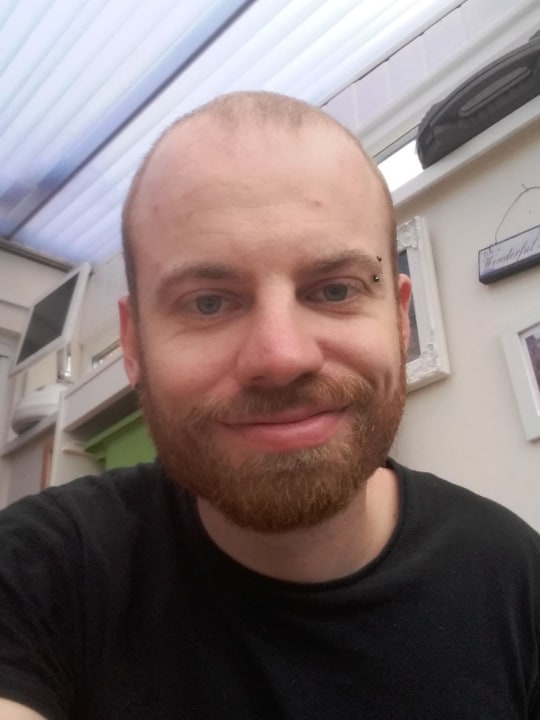Human sexuality begins to emerge at an early age. Our gender identity takes form and we become involved in complex dynamics, at first with our parents, and later with society in general.
Watch a Short Excerpt:
Transcript (continued):
William: I wanted to get into the Oedipus phase or the Oedipus complex, it has different names, which is very interesting. I don't know all that much about it. But it plays a huge role in that development of gender and your gender role in society. So here's what I have learned about it. When you're born... first of all let's start with birth. When you're born you are very close to your mother, obviously. You were part of her body for a long time. And you want to remain with her. So most of what I'm saying is from the perspective of a boy. But let's see if we can make it more general. So when you're when your tiny baby, in the first months of your life, you want to be close to your mother all the time. I heard that you can even feel like you are one person with her. And so, one of the first things that happens in your in the development of your identity is being separated from her, and I'm not talking about the physical separation. Obviously that's a huge thing. I wonder if it's maybe traumatic for newborns. But the psychological part as well. So when do we realize that we are not the same person as our mothers? Babies don't necessarily have that consciousness until they are 2, 3 or maybe even 4. There are some psychological tests to detect that. But one of the issues that comes with this separation is: Well, if I'm not that person, meaning the mother, then Who am I? I want to be like someone to figure out what I should be like. And so in the case of being a boy, you very quickly figure out who is male and who's female. I'm not sure how many of the features we have go into that. I suppose voice is a big one.
Steven: Yeah It can be two different things. You've got the social-cultural and the biological. But you very much Mama, Dada. That's the two things that are thrown upon you. It's almost forced upon you, before you even get a chance to state your own understanding of the world. It's like one is Mama and wants your attention, and one is Dada and wants your attention, potentially. It's not always that way.
William: Exactly. I just remember what we said in the last episode, how the convention is to have two parents. I mean nowadays it's often only one. But it would be fascinating to find out what else could be possible, what that would mean for the children and their development. So if you want to get back on that topic that would be great. Did you have any more insights?
Steven: My memory is terrible. I can't always remember what we spoke about last time. But I do remember discussing parentage and how interesting it would be to raise various different children from various different parents in a culture of, say, just a family unit, I guess, of say ten different parents, and how broadening that would be for a child, in my opinion. It might be really confusing. I don't know.
William: I haven't thought it through either. Obviously you would get contributions from more people, more personalities. That sounds like a positive thing. But the big question for me is what it would mean for your sexual identity. I could see there being a good purpose for having one male and one female parent, so that you can learn about the interaction of the genders. We just don't know what what else is possible, and what consequences it would have.
Steven: Just to clarify, because this is being me ignorant here. In terms of sexual identity, do you mean male or female, or do you mean you're attracted to?
William: Well I was at first going for male or female. But of course, yes, the attraction is a big factor as well. That's part of it. Some people call it orientation. But I think that word doesn't go deep enough.
Steven: It's just definitions of words, because this is a fascinating one. I always remember back on... If you're filling out a form, for example for a job. It would say it would say "sex: male or female", and now it says "gender: male or female". That happened in the last 10 or 20 years or so, where the definition has changed. It used to be your sex was male or female. That was the term that was used. And now I think that we used the term "gender", which is fine, but I think people still think that sex can mean gender, too. I think they're trying to make it two different things.
William: Yeah, so are you one of those people who likes the differentiate between the two. Would you like to define them? Oh is that complicated in itself?
Steven: Maybe, I don't want to think about it too much. I think it has its place. I think, like all things, when I think about like topics like this, there is no right or wrong. It's just what options people want. So if you want to be called... you know your sexual orientation is male, female or if your gender is male or female, then go for it. Who is anyone else to say "no" or "yeah" to these things? Noone has as a place to say.
William: Yeah. I don't mean we're trying to be politically correct. Just we're not trying to be confusing.
Steven: Yes.
William: We can define for ourselves what we want those words to mean, in the course of this episode.
Steven: I think one way I would interpreted it, and it's probably wrong because I'm ignorant, is, to me, is what you feel you are on the inside, I guess. So that's just the way I define it. It's probably not the current definition of. But if I say my sex... I'm a man because I have you know testicles and penis, that makes me a man physically. But gender-wise I'm just human. So in a way I probably identify as non-binary in terms of, I guess, "Who am I?", in terms of Stephen, the entity inside this body, or the controller's body or whatever, however you want to define it. I don't see myself as male or female.
William: So this is particularly relevant for transgender people, right?
Steven: Yes.
William: For me this is where this differentiation became interesting the first time, you know, because there people can have the opposite feeling of what their body is made of. It's very interesting how anyone could actually say that the thing inside of my body the, I don't know if you want to call it "spirit" or "mind", "being" does not necessarily need to be male or female. That's very interesting. I personally have not thought about that too much. The question has never come up. Obviously different people are confronted with different questions, and at different times of their life. So I'm going to think more about that one.
Steven: Again, going back to the young age you talked about. I think that culturally we're very bad at allowing children to just experience who they are, because you hear about things like, you know, young boys will just want to wear a dress. That's just what they enjoy. They like playing with towels or whatever. For some reason that's just such a big issue for a lot of people. In a way we seem to be on a cusp of... Well, we're in it. We're in the revolution. We're in the moment of this, and it lasts X amount of years, where it is finally becoming acceptable and okay, and realizing that that's just a human being that's just exploring things that actually don't matter: what clothes you wear. what toys you play with. To think that that's gonna have an impact negatively or positively really. It just is. It's just if that is what makes the child happy, then whatever.
William: Right. We have strong expectations for children.
Steven: We do. So much pressure.
William: And when they don't turn out the way we expect, I don't know. I mean, I'm not a parent myself. But I just see it around me. It's also a topic in the media sometimes, how when things don't go according to tradition or expectation we are disappointed. We take it personally. We try to force our expectation onto that child, and that is just for the worse, it makes things worse.
Steven: It seems happen to a lot of fathers, where they can only really relate to other men. There seems to be a trend. Maybe it's false. But a trend that I've noticed is that... not always because I hate to make absolute statements. But men tend to, you know, not be as empathetic and nurturing and etc. etc. as women if they can't relate to women the same way women can relate to women and men. Therefore when they have a daughter they seriously struggle. They're still loving and caring and really, you know, protective. But they don't know necessarily how to relate, and they end up installing in them so-called masculinity or their male ideology, like sports. You know, you hear that all the time for America. I don't know why this is. How I Met Your Mother, that TV show, Robin, where she's constantly like all laddish, and this is the way that I was brought up because of my dad. There's a few examples in TV shows. I don't know how frequent that actually is in society. But I imagine is quite prominent, where because you want to bond with your child and if you only have certain things you'd like, if they like other things you don't feel like you can relate. So therefore you want to find something that you can connect to. Because you're an adult and they're a child you're more domineering therefore you inflict your... it's easier to fit your ideology of the child to your child because it just wants to have your approval all the time rather than going down to the child's level and being like "what do you want to do, and I'll learn from you?" I guess that shapes "Who am I?" Then again to flip that to the female side where mums I'm sure very often when they have sons actually sometimes, they perhaps wanted a daughter, and therefore inflict a lot of the feminine ideology onto their children, their sons.
William: Let me get back to the Oedipus thing. I was at the stage of becoming a separate individual. But I didn't get into the Oedipus part yet. So around the age of three we, and and by this time we've decided whether we are like father or like mother, and in the case of the boy he will feel sexually attracted to his mother. And this is called... this phase is named after Oedipus in some Greek story because he, I mean, even as an adult he was involved with his mother and attracted to his mother.
Steven: The interesting thing about our story is that it's a false use of him because he didn't know it was his mother.
William: Right, okay.
Steven: So the prophecy was that he would... When he was born there was a prophecy that he would kill his father and marry his mother or whatever. And then they abandoned him, and he went off and lived his life. And he comes back and no one knows who he is. He doesn't know he is kind of thing, and then just happens through circumstance to kill his father and then marry his mother, but didn't know that. So it is an interesting misnomer. But it works, the fact that obviously it's used and it works. Freud used it. The fact that there are some, whether biological or cultural phenomenon, where that can be the case, I guess. Like all things, I never try to say it is this way or it is that way. It is for some people or others, or whatever.
William: I wonder whether Oedipus would like the way we use his name now, the thing we connect with his name or not.
Steven: Luckily the Oedipus thing is just a story. As far as we're aware, it's not actually... it's a myth, not a history, I think.
William: Okay, I wasn't aware.
Steven: I love my Greek nonsense. I'm pretty sure it was a myth.
William: Okay.
Steven: But then again, you have prime examples of this, what you're talking about from the early age is, you know, from the age of like 7, 8, you try to copy your parents, even younger, having boyfriends and girlfriends and stuff. And you're already in that phase of trying to find a life partner, I guess. Then you've copied that from your parents.
William: So that would be elementary school. Yeah, I remember there being, or even in kindergarten, there were relationships, or you know pseudo-relationships.
Steven: Oh yeah.
William: People were even getting married in kindergarten.
Steven: Because that was the epitome of adulthood, wasn't it. As a kid you'd think, okay what you were taught that getting married was the epitome of being an adult. So that's the thing you'd aspire for.
William: Yeah, little girls have their dolls and their prams even sometimes. Because they want to be a woman, and that's what it seems to be about.
Steven: Yeah, because that's what they see. It would be fascinating, as culture changes hopefully more and more, to see how frequent that actually is in a society where it isn't just pushed upon them from a young age. Interesting.
Other Episodes:
Ep. 51: How Conditioned Are We ?
How much of what you do, think and feel comes from intentional, free chosing? How much of your actions and decisions are pre-programmed? You are the product of your upbringing, culture and genetics. What is out of our control? What can we influence? How can we counteract our predestination?
Ep. 50: What Am I Responsible For ?
Are you taking too little responsibility for your actions, or perhaps too much? How much are you able to understand or determine the consequences of your decisions? Are you in control of anything? Is free will an illusion? Can you do something to improve your thoughts, feelings and relationships with...
Ep. 49: Empathy Can Be A Super Power
Everyone has the choice of either living isolated from other people and their own feelings on the one hand, or to connect with others and their own emotional core. The road towards connectedness involves vulberability and weakness. But it leads to a very rewarding ability that includes deeper understanding of...
Ep. 48: Why Am I Ashamed?
What secrets do you have? What facts about you must never become known to others? What happens in our childhood that implants beliefs in us that hide away for the rest of our life? Can we uncover them deliberately? Can we regain the emotional freedom and levity that playing children...







